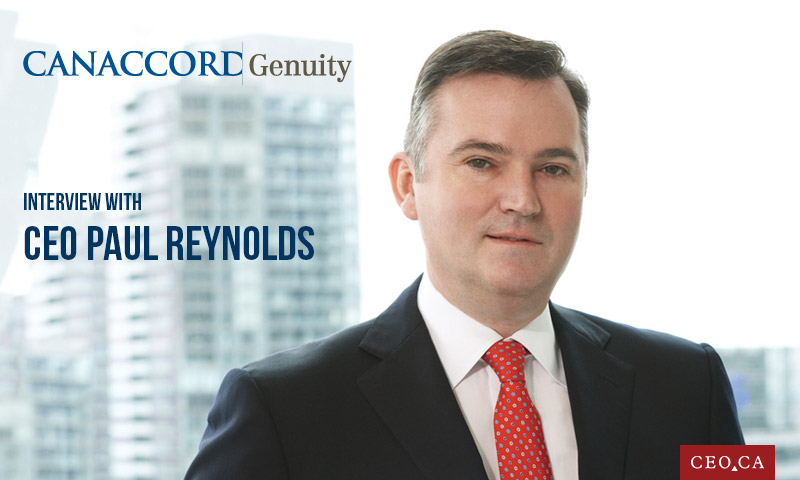Canaccord Genuity, the firm with roots in Canada’s venture capital business, has aggressively branched out into new markets in recent years. The strategy appears to be bearing fruit.
Under the leadership of Paul Reynolds, 51, and CEO since 2007, Canaccord Genuity has used acquisitions and a shift overseas to transform the once Canada- and mining-centric brokerage into a global investment bank. Some 70% of the firm’s revenues are now flowing from outside of Canada.
Canaccord’s stock price has almost doubled in six months as investors have awoken to the earnings potential of the firm’s acquisitions. Additionally, the global platform Canaccord has established in the mid-market sector (companies worth $250 million to $10 billion) appears to have a moat around it, with competition in this space largely restricted to domestic firms with a narrower reach.
The tidal change at Canaccord began with its 2010 purchase of research and M&A shop Genuity Capital Markets for C$286 million. The renamed Canaccord Genuity quickly followed with a set of smaller acquisitions in Asia and Australia, then the Collins Stewart acquisition in the U.K. The deals doubled Canaccord’s headcount and strengthened its global M&A advisory practice.
Canaccord’s diversification appears to be well-timed. The company just posted record revenue and earnings in its U.K., U.S., Australian and Singaporean businesses, at a time when Canaccord’s Canadian business had its most challenging year in a decade.
“Our strategy of having a global investment bank focused on the mid-market is clearly differentiating us from our domestic competitors in all markets, and we’re gaining market share in practically all the places we do business,” CEO Paul Reynolds said in a phone interview.
Reynolds sees the Canadian business coming back this year. He points out that Canaccord Genuity has handled more Canadian IPOs recently than any firm, and been involved with some prominent M&A deals, including advising Yamana on their Osisko purchase, and advising B2Gold on their Papillon acquisition.
Another Canaccord client, Amaya Gaming, recently agreed to purchase the owner of PokerStars for $4.9-billion in a deal that could see $30 million in fees come to Canaccord. Amaya has been a client of the firm for 10 years.
The company expects continued international growth. In the U.S., for example, Canaccord aims to grow its $217-million revenue business to $400 million over the next 3-5 years. The firm has also consolidated management of its Australian, Singapore, Hong Kong and China businesses, which now earn $40 million revenue with 30% margins. Reynolds believes Canaccord can more than triple that business.
The firm has just over $10 billion in assets under administration in Canada and another $20 billion in the UK and Europe. Canaccord has been developing proprietary investment products for its wealth management clients, which are expected to increase profit margins.
Despite Canaccord’s new global focus, Canadian investment advisors are still important to the firm, Reynolds commented.
“It’s a very important part of our distribution model here in Canada, especially when you look at the real estate and structured products we’re involved in,” Reynolds said. “Many brokers that work for us are having their best years. Advisors that have a diversified business, with some transactional business and some fee-based advisory, that's a really good model for us, because they support our corporate business, but also have a conservative model for their clients,” Reynolds said.
Canaccord will be more aggressive in “selectively” recruiting investment advisors moving forward, according to Reynolds.
“If you know anyone great, tell them to call me," he added.
Going head-to-head with Canada’s deep-pocketed big banks to grow Canaccord’s wealth management business will not be easy.
"We appeal to investment advisors who don't want to be at a bank — not all do,” Reynolds said.
Still, Canaccord has $470 million in working capital to lure talent with.
The company’s share price has rocketed up by more than 130% over the past year, giving Canaccord a valuation of about $1.285 billion. Could there be much upside left in the stock?
"We’re trading at about 1.2x book value, which is relatively inexpensive for the growth of the company," Reynolds replied. "We’re trading at 10-11x forward earnings estimate average. Our peers in the U.S., Europe, and the U.K. are trading between 15 to 17 times forward earnings. Almost 70% of our revenue is from outside Canada, principally in the U.K. and U.S. I think you're going to see a re-rating of the multiple we're trading at, more to the 15x multiple, so I think there is a lot of upside in our stock."
Canaccord Genuity’s stock, which is more than 50% employee owned, was added to the S&P/TSX Composite Index on June 20, 2014. This will likely increase demand for the company's shares.
Peter Brown’s recent retirement from the firm he founded in 1968 marks the end of an era at Canaccord, and Reynolds was quick to praise his former boss.
“Obviously we wouldn't be here today if it wasn't for Peter," Reynolds said of the larger-than-life business legend. “He’s moving on to do his own things.”
I asked Reynolds if he had his own plans to step aside now that the company appears to be on firmer footing, but he shut me down.
"I love our work and will be here at least five more years," he said.






















